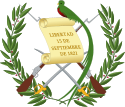Foreign relations of Guatemala
From Wikipedia, the free encyclopedia
| Guatemala |
 |
Other countries · Atlas Politics portal |
Guatemala's major diplomatic interests are regional security and, increasingly, regional development and economic integration. The Central American Ministers of Trade meet on a regular basis to work on regional approaches to trade issues. In March 1998, Guatemala joined its Central American neighbors in signing a Trade and Investment Framework Agreement (TIFA). In 2000 it joined Honduras and El Salvador in signing a free trade agreement with Mexico, which went into effect in 2001. Guatemala also originated the idea for, and is the seat of, the Central American Parliament (PARLACEN).
Guatemala participates in several regional groups, particularly those related to the environment and trade. For example, US President Clinton and the Central American presidents signed the CONCAUSA (Conjunto Centroamerica-USA) agreement at the Summit of the Americas in December 1994. CONCAUSA is a cooperative plan of action to promote clean, efficient energy use; conserve the region's biodiversity; strengthen legal and institutional frameworks and compliance mechanisms; and improve and harmonize environmental protection standards.
Illicit drugs: transit country for cocaine shipments; minor producer of illicit opium poppy and cannabis for the international drug trade; active eradication program in 1996 effectively eliminated the cannabis crop; proximity to Mexico makes Guatemala a major staging area for drugs (cocaine shipments)
[edit]Bilateral relations
[edit]Belize
Guatemala has a longstanding claim to a large portion of Belize; the territorial dispute caused problems with the United Kingdom and later with Belize following its 1981 independence from the UK. In December 1989, Guatemala sponsored Belize for permanent observer status in the Organization of American States (OAS). In September 1991, Guatemala recognized Belize's independence and established diplomatic ties, while acknowledging that the boundaries remained in dispute. In anticipation of an effort to bring the border dispute to an end in early 1996, the Guatemalan Congress ratified two long-pending international agreements governing frontier issues and maritime rights.
In early 2000, the Guatemalan Foreign Ministry proposed a border settlement that would transfer more than half of Belize's territory to Guatemala. Following a spate of border incidents, both sides agreed during talks under OAS auspices in November 2000 to confidence-building measures to reduce tensions. They followed that with an agreement on opening substantive discussions on the dispute.
Notably, both Guatemala and Belize are participating in the confidence building measures, including the Guatemala-Belize Language Exchange Project (for more information see: www.guatemalabelize.com and www.confidence2.org ).
[edit]China
Guatemala maintains official relations with the Republic of China (known as "Taiwan") instead of the People's Republic of China.
[edit]El Salvador
[edit]Honduras
[edit]Mexico
[edit]Russia
Main article: Guatemala-Russia relations
[edit]United States
Relations between the United States and Guatemala traditionally have been close, although at times strained by human rights and civil/military issues. U.S. policy objectives in Guatemala include:
- Supporting the institutionalization of democracy and implementation of the peace accords;
- Encouraging respect for human rights and the rule of law, and implementation of the International Commission against Impunity in Guatemala (CICIG);
- Supporting broad-based economic growth and sustainable development and maintaining mutually beneficial trade and commercial relations, including ensuring that benefits of CAFTA-DR reach all sectors of the Guatemalan populace;
- Cooperating to combat money laundering, corruption, narcotics trafficking, alien-smuggling, and other transnational crime; and
- Supporting Central American integration through support for resolution of border/territorial disputes.
The United States, as a member of "the Friends of Guatemala," along with Colombia, Mexico, Spain, Norway, and Venezuela, played an important role in the UN-moderated peace accords, providing public and behind-the-scenes support. The U.S. strongly supports the six substantive and three procedural accords, which, along with the signing of the December 29, 1996 final accord, form the blueprint for profound political, economic, and social change. To that end, the U.S. Government has committed over $500 million to support peace implementation since 1997.
Violent criminal activity continues to be a problem in Guatemala, including murder, rape, and armed assaults against persons of all nationalities. In recent years the number of violent crimes reported by U.S. citizens has steadily increased, though the number of Americans traveling to Guatemala has also increased.
Most U.S. assistance to Guatemala is provided through the U.S. Agency for International Development's (USAID) offices for Guatemala. USAID/Guatemala's current program builds on the gains of the peace process that followed the signing of the peace accords in December 1996, as well as on the achievements of its 1997-2004 peace program. The current program works to advance U.S. foreign policy objectives by focusing on Guatemala's potential as Central America's largest economy and trading partner of the United States, but also recognizes the country's lagging social indicators and high rate of poverty. The three areas of focus for USAID/Guatemala's program are modeled after the Millennium Challenge Account areas--ruling justly, economic freedom, and investing in people.


